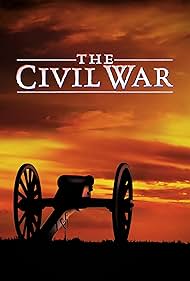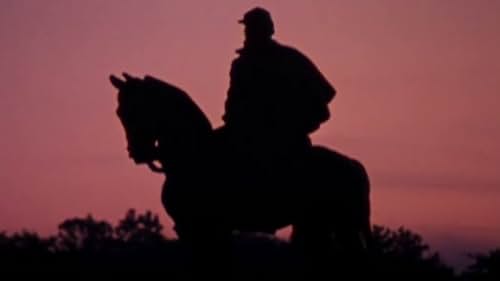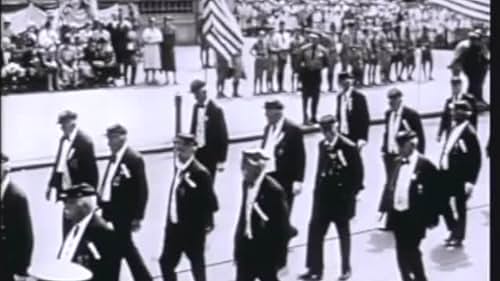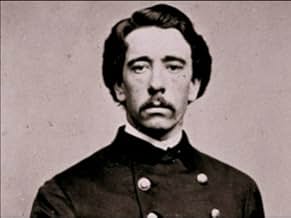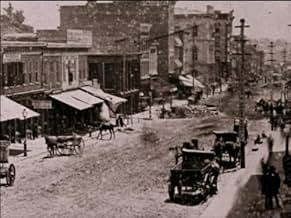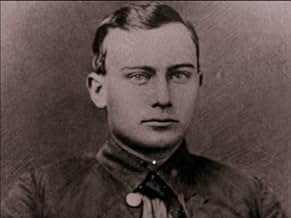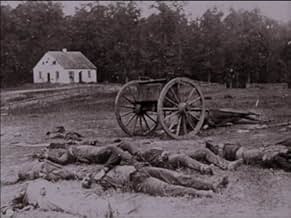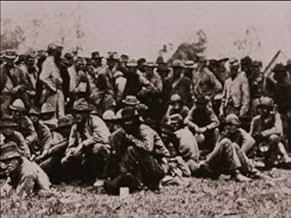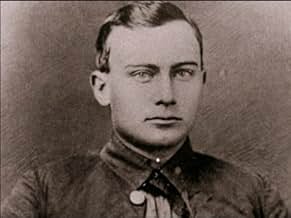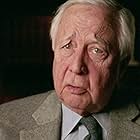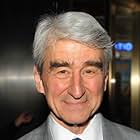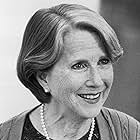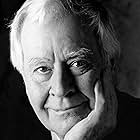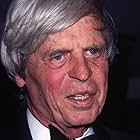Un'indagine completa sulla guerra civile americana.Un'indagine completa sulla guerra civile americana.Un'indagine completa sulla guerra civile americana.
- Vincitore di 2 Primetime Emmy
- 14 vittorie e 3 candidature totali
Sfoglia gli episodi
Trama
Lo sapevi?
- QuizShelby Foote became a celebrity after the success of this mini-series. Foote's phone number was listed in his local phone book, and he received frequent calls from fans. He never removed his number from the phone book, and received calls whenever the mini-series aired for the rest of his life.
- BlooperContrary to this documentary (and many historians) Winfield Scott never recommended Robet E. Lee for anything more than a "significant command" nor did Lincoln offer Lee command of the Union Army.
An advisor to the President, Francis P. Blair, DID offer Lee command of the Defenses of Washington, via letter, but there are NO records that Lee. An Lincoln ever met in person.
- Citazioni
Abraham Lincoln: As a nation, we began by declaring that "All men are created equal." We now practically read it, "All men are created equal, except Negroes." Soon, it will read "All men are created equal, except Negroes, and Foreigners and Catholics." When it comes to this, I should prefer emigrating to some country where they make no pretense of loving liberty. To Russia, for instance, where despotism can be taken pure and without the base alloy of hypocrisy.
- ConnessioniFeatured in Entertainment Weekly's the New Classics: TV (2008)
Recensione in evidenza
It's a technically revolutionary film. Burns and his colleagues have changed the nature of the documentary. Working with old photos on glass plates, an unpromising base, the occasional talking head, and often penetrating and sometimes poignant voiceovers, he contributed to our cultural iconography. His touches have been imitated often in the following decade: the sound of buzzing locusts, the voice-over reading a letter and then signing off by reading the name of the writer aloud, are now taken-for-granted techniques in documentaries (and commercials as well).
Before this series, interest in the Civil War was practically nonexistent. I'm not referring to seeing pretty ladies bounce down the stairs of the big house wearing hoop skirts and ribbons, but the ghastly things taking place at locations that previously had barely rung a bell, like Shiloh.
I was teaching at an eastern university when this series appeared, roughly fifty students, known to be among the brightest available, majoring in communications. I asked the class how many had watched at least one episode. One hand went up, tentatively. I asked why she'd been so hesitant and she said, well, she hadn't really "watched" it, but her husband was a CW buff and was taping it while she passed through the living room. Fewer than fifty percent of our High School seniors can pin the Civil War down to the correct half-century. I'm tempted to click the "Spoilers" box to warn those who don't know who won.
It's against this background of general ignorance that "The Civil War" should be viewed. The film's intent was as much popular as academic, and it seems to have had a good deal of general appeal, my elite class notwithstanding. Popular enough so that a book appeared shortly afterward, "Historians Respond," edited by Bob Toplin, which predictably consisted almost entirely of carping over details, and of claims that Burns missed the whole point of the CW, that he didn't pay enough attention to the role of women and African-Americans. In other words, that he didn't make the kind of movie that THEY would have made. They demand too much. For one thing, a viewing of the series makes it clear that Burns does present the points of view of women and African-Americans. If the prevailing professional opinion is that he didn't go far enough, well, every book has a last page. A program dealing exclusively with the part that slavery played in the CW would have been another program.
A word about the commentators. Bearse knows combat; he was a marine on Guadalcanal. He sticks to military facts, mostly tactical. Senator Symington is surprisingly smooth and knowledgeable. The two chief commentators represent the original opposing points of view. Shelby Foote states proudly in the epilogue to one of his historical volumes on the CW, "I am a Mississippian."
But he's a gentleman, not a stereotypical redneck. He admires the Confederate Southern Army without disparaging the Federals. (Who could help admiring the CSA as a military force?) But, like all polite Southerners, he seems slightly ill at ease discussing the CW in a public venue. He seems like a nice guy and is a marvelous story teller. Barbara Fields, an academic historian, has less screen time. The first impression the viewer gets is that, wow, she's a knockout! The second is that she's cool as a cucumber and presents the modern view that the CW was all about slavery, that whites were almost peripheral to the issues. It's hard to argue with her. After all, slaves were suffering for two hundred years while whites were engaged in "the pursuit of happiness". Yet her anger flares up and it seems misplaced to me. "I don't have much patience with people who say that abolition was difficult because of political circumstances". I hope future historians are kinder to us than our current ones are to Americans of the 1860s.
Slavery should never have been sanctioned under the Constitution but if allowances hadn't been made, the South would not have joined the Union. It was the slaves that paid the price for that union. Given that it was already in place, what could Lincoln have done about slavery that he did not in fact do? Declare it illegal at the firing of the first shot? Hardly. There were slave states that did not secede. Any attempt to turn the CW from a fight to preserve the union into a fight to free the blacks might have turned them back into the Southern camp. Moreover, Lincoln's support in the legislature depended on Democrats, and Republicans too, who were opposed to any attempt to make the CW into a struggle for black freedom. If Lincoln lost his majority in congress he might have lost the whole game. As it was he jumped at the first chance to issue his Emancipation Proclamation. Fields was wrong, too, in saying that we're still fighting the CW today. The chief issues of the war have been resolved. There is no more slavery. African-Americans can vote if they want to. They can take whatever empty seat on the bus is available. Affirmative action works to their benefit. If she means that "social equality" has still not been achieved, she's quite correct. One of the reasons perfect equality hasn't been achieved is that the achievement would involve our completely ignoring the fact of race in this country, and at this point it's inconceivable.
Equality depends on everyone's ability -- and willingness -- to ignore race and ethnicity. I'm all for it. These tribal loyalties are nothing if not bothersome. Burns's series shows one earth-shattering step that has brought that still impossible goal a little closer than it was.
Before this series, interest in the Civil War was practically nonexistent. I'm not referring to seeing pretty ladies bounce down the stairs of the big house wearing hoop skirts and ribbons, but the ghastly things taking place at locations that previously had barely rung a bell, like Shiloh.
I was teaching at an eastern university when this series appeared, roughly fifty students, known to be among the brightest available, majoring in communications. I asked the class how many had watched at least one episode. One hand went up, tentatively. I asked why she'd been so hesitant and she said, well, she hadn't really "watched" it, but her husband was a CW buff and was taping it while she passed through the living room. Fewer than fifty percent of our High School seniors can pin the Civil War down to the correct half-century. I'm tempted to click the "Spoilers" box to warn those who don't know who won.
It's against this background of general ignorance that "The Civil War" should be viewed. The film's intent was as much popular as academic, and it seems to have had a good deal of general appeal, my elite class notwithstanding. Popular enough so that a book appeared shortly afterward, "Historians Respond," edited by Bob Toplin, which predictably consisted almost entirely of carping over details, and of claims that Burns missed the whole point of the CW, that he didn't pay enough attention to the role of women and African-Americans. In other words, that he didn't make the kind of movie that THEY would have made. They demand too much. For one thing, a viewing of the series makes it clear that Burns does present the points of view of women and African-Americans. If the prevailing professional opinion is that he didn't go far enough, well, every book has a last page. A program dealing exclusively with the part that slavery played in the CW would have been another program.
A word about the commentators. Bearse knows combat; he was a marine on Guadalcanal. He sticks to military facts, mostly tactical. Senator Symington is surprisingly smooth and knowledgeable. The two chief commentators represent the original opposing points of view. Shelby Foote states proudly in the epilogue to one of his historical volumes on the CW, "I am a Mississippian."
But he's a gentleman, not a stereotypical redneck. He admires the Confederate Southern Army without disparaging the Federals. (Who could help admiring the CSA as a military force?) But, like all polite Southerners, he seems slightly ill at ease discussing the CW in a public venue. He seems like a nice guy and is a marvelous story teller. Barbara Fields, an academic historian, has less screen time. The first impression the viewer gets is that, wow, she's a knockout! The second is that she's cool as a cucumber and presents the modern view that the CW was all about slavery, that whites were almost peripheral to the issues. It's hard to argue with her. After all, slaves were suffering for two hundred years while whites were engaged in "the pursuit of happiness". Yet her anger flares up and it seems misplaced to me. "I don't have much patience with people who say that abolition was difficult because of political circumstances". I hope future historians are kinder to us than our current ones are to Americans of the 1860s.
Slavery should never have been sanctioned under the Constitution but if allowances hadn't been made, the South would not have joined the Union. It was the slaves that paid the price for that union. Given that it was already in place, what could Lincoln have done about slavery that he did not in fact do? Declare it illegal at the firing of the first shot? Hardly. There were slave states that did not secede. Any attempt to turn the CW from a fight to preserve the union into a fight to free the blacks might have turned them back into the Southern camp. Moreover, Lincoln's support in the legislature depended on Democrats, and Republicans too, who were opposed to any attempt to make the CW into a struggle for black freedom. If Lincoln lost his majority in congress he might have lost the whole game. As it was he jumped at the first chance to issue his Emancipation Proclamation. Fields was wrong, too, in saying that we're still fighting the CW today. The chief issues of the war have been resolved. There is no more slavery. African-Americans can vote if they want to. They can take whatever empty seat on the bus is available. Affirmative action works to their benefit. If she means that "social equality" has still not been achieved, she's quite correct. One of the reasons perfect equality hasn't been achieved is that the achievement would involve our completely ignoring the fact of race in this country, and at this point it's inconceivable.
Equality depends on everyone's ability -- and willingness -- to ignore race and ethnicity. I'm all for it. These tribal loyalties are nothing if not bothersome. Burns's series shows one earth-shattering step that has brought that still impossible goal a little closer than it was.
- rmax304823
- 13 nov 2002
- Permalink
I più visti
Accedi per valutare e creare un elenco di titoli salvati per ottenere consigli personalizzati
- How many seasons does The Civil War have?Powered by Alexa
Dettagli
Contribuisci a questa pagina
Suggerisci una modifica o aggiungi i contenuti mancanti

Divario superiore
By what name was The Civil War (1990) officially released in Japan in Japanese?
Rispondi